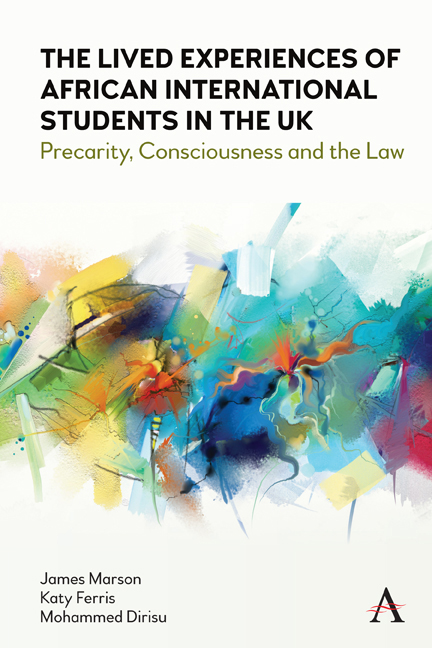 The Lived Experiences of African International Students in the UK
The Lived Experiences of African International Students in the UK Book contents
- Frontmatter
- Contents
- Preface
- Acknowledgements
- Legislation
- Case Law
- 1 Introduction
- 2 Methodology
- 3 Student Migration and Global Inequality
- 4 Migration as a Socio-Legal Phenomenon
- 5 The ‘Student-Migrant-Worker’ Meets ‘Precarity’
- 6 The ‘Utterly Transactional Worker’
- 7 Semi-Legal Working?
- 8 Conclusions
- Bibliography
- Index
3 - Student Migration and Global Inequality
Published online by Cambridge University Press: 13 September 2022
- Frontmatter
- Contents
- Preface
- Acknowledgements
- Legislation
- Case Law
- 1 Introduction
- 2 Methodology
- 3 Student Migration and Global Inequality
- 4 Migration as a Socio-Legal Phenomenon
- 5 The ‘Student-Migrant-Worker’ Meets ‘Precarity’
- 6 The ‘Utterly Transactional Worker’
- 7 Semi-Legal Working?
- 8 Conclusions
- Bibliography
- Index
Summary
Introduction
Unfortunately, despite their importance as a distinct migrant population, and also in terms of the topic's potential for enriching our understanding of contemporary forms of mobility, there has been relatively little research on international student mobility in comparison to other forms of migration. (Riaño and Piguet 2016, 1)
International students make up the bulk of migrant flows into most Organisation for Economic Co-operation and Development (OECD) states. Therefore, it is perhaps surprising that the prevalence of this distinct cohort is not paralleled in the body of scholarship on migration (IOM 2018, 105). The literature is quite fragmented and inherently dependent on the discipline concerned; economists for instance tend to focus on the fiscal impacts of this group, sociologists interrogate their societal implications, geographers highlight mobility trends, meanwhile pedagogues situate them within educational institutions for didactic intents. While definitions may vary, international students are generally understood as having left their country of origin and moved to another country for the purpose of study (Riaño and Piguet 2016). More so, as student migration essentially involves the transnational mobility of students outside their country of birth or citizenship for study, international students can easily be portrayed as part of the migrant population (King and Raghuram 2013; Riaño and Piguet 2016; Spring 2009). Within this niche scholarship, emergent interpretations have sought to account for, and explain, international student mobility patterns and the implications for the sending and receiving states (Hawthorne 2010; Waters and Brooks 2010; Xiang and Shen 2009). Centring on the individual, the socioeconomic and cultural capital students require for, as well as acquire through, the process of transnational mobility has also garnered attention (Baláz and Williams 2004; Brooks and Waters 2009; Findlay et al. 2006; Waters 2006). In an era marked by heightened globalisation, international students have been portrayed as global citizens and as coparticipants in higher education as a transnational enterprise (King and Raghuram 2013, 127).
In this chapter we consider international student mobility through the lens of global inequality, with a focus on student flows from sub-Saharan Africa. We examine student mobility trends, the inherent individual and institutional drivers that underpin this and the consequences for the relevant parties involved.
- Type
- Chapter
- Information
- The Lived Experiences of African International Students in the UKPrecarity, Consciousness and the Law, pp. 29 - 54Publisher: Anthem PressPrint publication year: 2022


